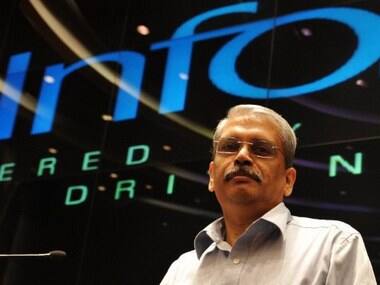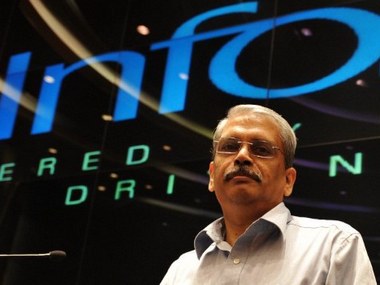The opposition to the Aam Admi Party’s economic policies is getting louder from its industrialist supporters. But S Gopalakrishnan,CII & vice chairperson ofInfosys believes that the Aam Aadmi Party will be able to govern and move to the Centre in a few months.
Gopalakrishnan’s comments come a day after Infosys Executive Chairman Narayana Murthy raised concerns over the party’s decision to disallow FDI in the retail space. In an exclusive interview to CNN-IBN, Murthy said AAP must stop practising the economics of the 1940s and 50s.
Gopalakrishnan pointed out thatthings on the ground were improving gradually, and said he expected the situation to get even better after the upcoming Parliament elections.
Speaking on the sidelines of the Davos 2014, the spotlight of the World Economic Forum, Gopalakrishnan spoke to CNBC-TV 18 about foreign investors, global economy and AAP’s policies.
Below is the edited transcript of Gopalakrishnan’s interview to CNBC-TV18.
What the sense you get of what 2014 holds in store for the global economy? Is this going to be a year of a stable recovery?
[caption id=“attachment_105525” align=“alignright” width=“380”]
 AFP[/caption]
AFP[/caption]
The global economy is recovering and in that sense the focus is now shifting to some of the societal issues. So, one of the key agenda point this time, for Davos is equality equity. There is inequality going up in many parts of the world, unemployment is very high in many parts of the world especially with youth, sustainability is a challenge with climate change. So, this is an opportunity to address some of these issues in this year’s forum. When it comes to inequality, I think India has a story to tell because we have been trying to address inequality. If I look at the last 20 years, we have done a fantastic job of brining large number of people, more than 200 million people into the middle class. I think that is something we can be proud of and we can talk about.
Are you getting a sense that the investment mood amongst large multinational corporations (MNC) is finally picking up - that Europe has turned the corner, the US is looking better with every passing months and even though we had trouble with emerging markets in the last year, things are not half as bad as they did seem in the beginning of 2013. Will this be a year of recovery for the global economy?
Impact Shorts
More ShortsIt is a year of recovery for the world economy. It is a year of looking at opportunities for investment for multinational corporations, for businesses around the world. It is a year where they would reassess what opportunities exists and how they want to take advantage of those opportunities. However, the focus on cost will not go away. There is tremendous focus on cost across the board. When I meet people in Australia, Europe and in the US; the focus on cost is not going away because growth markets are developing countries and developing countries are very sensitive to price. So, those are the growth markets and they are very sensitive to price and so multinational corporations will have to make sure that they are competitive, they can create a large opportunity for themselves in developing countries.
When they talk to you about investments, do you see a bulk of those investments headed to emerging markets (EMs) as you pointed out or are we, countries like India, going to face stiff competition from countries like the US, which are picking up in terms of growth where opportunities are in the multitudes and where a lot of multinational corporations (MNC) would feel a lot of comfortable with the regulatory or governmental environment and say why not invest at home if things are going to look better as oppose to investing in a country where I do not have the clearest idea of regulation or policy which has been the buzz there for India as well?
The US is expected to grow around 3 percent this year and this is a pretty good growth rate for a large economy like the US. It amounts to USD 15 trillion growing at around 3 percent. Definitely USA is going to compete for investments along with developing countries. Now India has to fight for its investments. India cannot be complacent, cannot say that we are a growing economy, so investments must come here. We have to look at the ease of growing business; we have to look at our policies in the foreign direct investment side, we have to make sure that the policies are consistent, long-term. We have to reassure the corporations around the world, the governments around the world that we mean business. I think it is necessary and when I look at the last six months, I am optimistic that, of course we have to go beyond the elections. Once the elections are over, I am very optimistic.
Let met question you in a little more in detail about that on two fronts - first, the last couple of years here in Davos - and I have been witnessed to it first hand, the India story was dead, nobody wanted to talk about India. Is this year going to be a slight improvement as far as the India positioning at Davos is concerned?
The focus on India, the attraction on India never went away, in fact if you listen to people, they are concerned about India because they believe that India is a great opportunity. They believe that India should do well, they want India to do well and that is the reason why when you talk to people in private, they tell you very clearly that they are concerned about India because of the opportunity that India provides them. Yes, in the last two years things have been difficult, things have been very slow and lot of issues came up because of retrospective amendments and things like that. Those pose challenges, but many of those are getting addressed. Some of the infrastructure projects are getting restarted and that is why I said we should look beyond the elections and beyond the elections I am optimistic at this point.
We looked beyond the assembly elections. It was a rout for the Congress. It was a fairly big victory for the Bharatiya Janata Party (BJP) but more surprisingly was coming to power of the Aam Admi Party (AAP) in Delhi. While I don’t think anybody in this country will not support the citizen movements, some of their economic policies are currently being criticized. For instance, the power subsidies, the water subsidies and we are seeing this have a copycat impact on the politics of other states as well. Maharashtra as recently as just a couple of days ago decided to cut power tariffs, are you not worried as the head of CII and the head of one of the country’s best known companies that this competitive populism as it is called is going to be another fatal blow for an economy that is struggling to recover from the last few years of policy paralysis?
Yes, it is a cause for concern but I would point to two things. One is that the AAP is a new party. It is just six months old. I think they will struggle to figure out how to govern. Hopefully, once they figure this out, once they get a broader base, hopefully they will move to the center.
You sound very encouraged about it. What is your view on the coming to power of the AAP?
Clearly, they will have an impact on all the political parties and they will have an impact on how inclusive these parties would become, the candidates they would put up for.
So a positive impact?
I believe it is a positive impact and there is positive and there is some negative also. This is an election period. So, every party is now focused on winning. Hence the populist measures are clearly targeted towards the election.
)